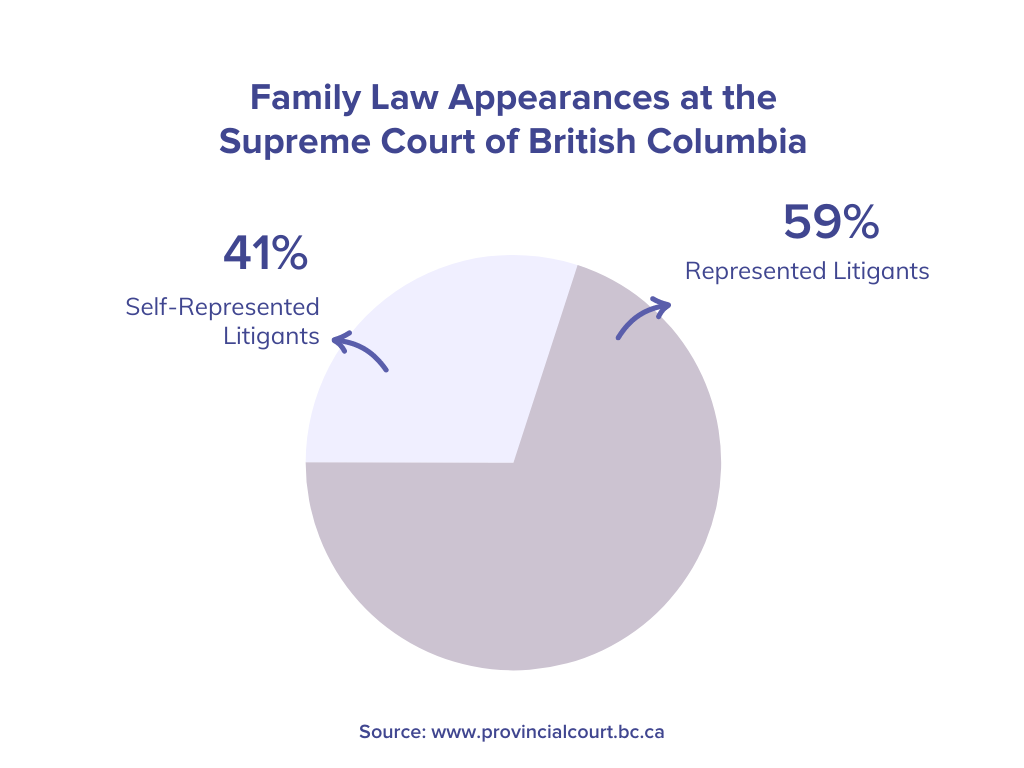I Can’t Afford a Family Lawyer: What Are My Options
The number of unrepresented litigants is rising. Judge of the Supreme Court of Canada Richard Wagner recently told a group of students that approximately 25% to 30% of those applying for admission to the Supreme Court of Canada are unrepresented and can’t afford a family lawyer.
Self-Represented Litigants: The New Normal
Unrepresented litigants are becoming more common, as people often can’t afford a family lawyer. In lower courts or administrative tribunals, it is common for litigants to be self-represented. For example, people often do not have lawyers for landlord tenancy disputes. Often lower courts are designed so lawyers are not necessary.
For example, the BC Provincial Court system for family law matters and small claims is intended to be user-friendly so that people do not need to hire lawyers.

Similarly, the Civil Resolution Tribunal (“CRT”) is an online process designed to be used without lawyers. The CRT can deal with small claims under $5,000 and strata disputes of any amount. There are even some restrictions on strata councils, companies, societies and co-ops being represented by lawyers at the CRT. They must request permission from the CRT to have legal representation.
The BC government is considering making similar changes to the process of disputing traffic tickets. The Attorney General of BC, David Eby, described it as an optional informal dispute resolution process that would take place without lawyers.
Even in more complex proceedings in the BC Supreme Court and BC Court of Appeal, there are often unrepresented litigants. However, being unrepresented at the Supreme Court of Canada and even the CB Court of Appeal should be rare.
Options If You Can’t Afford a Lawyer
If you are involved in litigation but cannot afford legal counsel, there are the following options:
Legal Coaching
Legal coaching is a process where you have a legal professional teaching you how to be an effective self-represented litigant. Legal coaches work with their clients as a team, giving legal advice and creating a plan where the client is in control of their matter.
For more information, please check out our blog post about Legal Coaching at YLaw.
Unbundled Services /Limited Scope Retainers
Unbundled services are different than legal coaching in that you hire a lawyer for specific tasks, such as drafting pleadings, appearing for certain court cases, and providing background advice. Unbundled services can be an affordable option when you need some legal advice but you cannot afford full representation.
Legal Aid
Legal aid coverage is based on income and assets. However, as mentioned by Justice Wagner, due to government underfunding of the legal system, there are still many people who cannot afford a lawyer but do not qualify for legal aid. Also, if family property is in dispute, that often disqualifies people for legal aid coverage.
For more information, please visit the Legal Aid BC website.
89 applications
If you are in a situation where you cannot afford a lawyer, but there is family property, it is possible to apply for an interim distribution of family property to pay for legal services and other expenses related to litigation. To be successful, you have to show that you are likely to obtain at least as much as the interim distribution in the final property division. It is not uncommon for interim distribution orders in the range of $100,000 or more for legal fees.
Interim distributions do require applications to court and usually do require the assistance of a lawyer.
For an example of a case where an application for interim distribution was unsuccessful, please read Leena’s Latest Case Victory: No You Can’t Have $80,000 To Pay Your Lawyer!
Access Pro Bono and other organizations
Several organizations help people who can’t afford a family lawyer:
If you require legal representation, legal coaching, or unbundled services, please contact our office for a consultation.